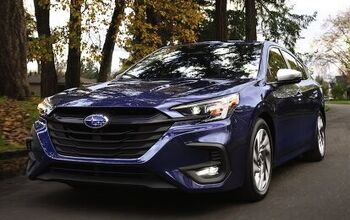4,846,885 Vehicles: Fiat Chrysler Launches Massive Recall to Prevent Runaway Cruise Control

In terms of size, this recall is one of the largest from a single manufacturer in recent memory. And the problem it’s designed to fix once served as the plot of a 1990s TV movie I can’t recall the name of.
While there’s only one known incident on its radar, Fiat Chrysler Automobiles has decided to go ahead with a recall of over 4.8 million Chrysler, Dodge, Jeep, and Ram vehicles to prevent them from getting stuck in cruise control.
According to the National Highway Traffic Safety Administration, a fault exists in several newer models that could prevent the driver from disengaging cruise control. The dangers associated with this are obvious.
In its summary, the agency writes:
If, when using cruise control, there is a short circuit within the vehicle’s wiring, the driver may not be able to shut off the cruise control either by depressing the brake pedal or manually turning the system off once it has been engaged, resulting in either the vehicle maintaining its current speed or possibly accelerating.
Expected to begin on July 6th, the recall covers many models. They include the 2014-2018 Dodge Journey, Charger, and Durango, 2015-2018 Dodge Challenger, 2014-2018 Chrysler 300, 2014-2017 Chrysler 200, 2017-2018 Chrysler Pacifica, 2014-2018 Jeep Cherokee and Grand Cherokee, 2018 Jeep Wrangler, 2014-2018 Ram 1500, the next-generation 2019 Ram 1500, and 2014-2018 Ram 3500, 4500, and 5500 trucks, in both regular guise and chassis cab varieties.
A list of production dates can be found here.
According to FCA, in October of 2017, “Powertrain Engineering recorded a test observation regarding the inability to cancel cruise control when the CAN-C bus was fully disabled (no communication among any control modules, indicated by a U0001 diagnostic code).”
That same month, the team alerted the automaker’s U.S. Vehicle Safety and Regulatory Compliance office to the issue, sparking a two-pronged investigation. Only one real-world incident matches the description of the test. The incident, which occurred earlier this year, involved a 2017 Dodge Journey operated by the Avis rental agency. (The driver was not hurt and contacted the NHTSA on March 2nd.)
FCA purchased the Avis vehicle in April following conversations with the driver and the federal road safety agency. Apparently, a nest of rodents was found in the vehicle during teardown, but the chewed-up wiring “could not have caused the CAN-C bus to stop communicating.” While the automaker was able to replicate the fault in a test vehicle by severing CAN-C bus communications at the engine control module connector, investigations continue into the cause of the runaway cruise control.
The identified models all contain “a modified fault handling strategy in the Engine
The automaker advises anyone who experiences the issue to “firmly and steadily” apply the brakes, shift into neutral, pull off to the side of the road, and place the vehicle in park. “Once placed in neutral or park, some of the vehicles will cancel cruise control when the engine hits a certain high-rpm threshold,” FCA noted.
Until the computer flash is performed, FCA advises owners of affected vehicle to refrain from using cruise control. This could mean a tired right foot for many motorists this weekend.
[Image: Fiat Chrysler Automobiles]

More by Steph Willems
Latest Car Reviews
Read moreLatest Product Reviews
Read moreRecent Comments
- 3-On-The-Tree Besides for the sake of emissions I don’t understand why the OEM’s went with small displacement twin turbo engines in heavy trucks. Like you guys stated above there really isn’t a MPG advantage. Plus that engine is under stress pulling that truck around then you hit it with turbos, more rpm’s , air, fuel, heat. My F-150 Ecoboost 3.5 went through one turbo replacement and the other was leaking. l’ll stick with my 2021 V8 Tundra.
- Syke What I'll never understand about economics reporting: $1.1 billion net income is a mark of failure? Anyone with half a brain recognizes that Tesla is slowly settling in to becoming just another EV manufacturer, now that the legacy manufacturers have gained a sense of reality and quit tripping over their own feet in converting their product lines. Who is stupid enough to believe that Tesla is going to remain 90% of the EV market for the next ten years?Or is it just cheap headlines to highlight another Tesla "problem"?
- Rna65689660 I had an AMG G-Wagon roar past me at night doing 90 - 100. What a glorious sound. This won’t get the same vibe.
- Marc Muskrat only said what he needed to say to make the stock pop. These aren't the droids you're looking for. Move along.
- SCE to AUX I never believed they cancelled it. That idea was promoted by people who concluded that the stupid robotaxi idea was a replacement for the cheaper car; Tesla never said that.


































Comments
Join the conversation
My father kept the ballast resistor in the car, where it was more useful when the car stopped on the road.
How many people here are old enough to remember GM's cruise control system that used a vacuum-actuated dashpot to hold the throttle open. Not only did that system have an off switch (or a brake pedal cut switch), but it had a secondary vacuum release valve on the brake pedal which dumped the vacuum in the dashpot, just in case the electrically-operated solenoid valve failed to do its job. It was a belt-and-suspenders approach that worked well. In contrast, the factory cruise control on my 1971 Ford LTD had a bad habit of occasionally sticking on, which, with a 429 engine, was quite scary when it attempted to full-throttle back to cruising speed after letting off the brake pedal or the "off" rocker switch on the steering wheel. There was no mechanical fail-safe way to turn that system off like GM had.